The Best Mattress For Nerve Pain, According To A Mattress Expert
The best mattress for nerve pain, or neuropathy, is designed to relieve pressure and provide support for extremities without being too firm. Excessively firm mattresses are often encouraged by well meaning health providers, but can often fail to relieve pressure points due to higher ILD’s (measurement of firmness)
Peripheral neuropathy affects millions of Americans, either in an annoying, nuisance manner, or in a life altering and debilitating capacity.
Finding the ideal mattress for nerve pain can help relieve or improve the symptoms in many cases by helping to relief pressure points at hips, shoulders, and other areas. I also recommend speaking to your healthcare professional and to seek advice about improving your sleep regimen and reducing pain and stress.
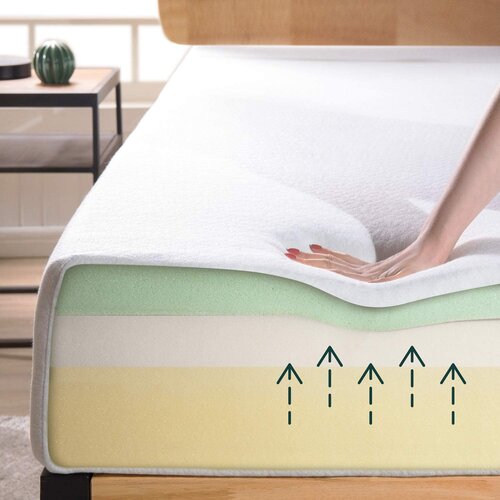
If your current mattress does not provide relief from tingling, numbness, or nerve pain, you might want to consider another option such as memory foam, gel foam, or natural latex.
I have neuropathy in both of my legs and sleep on a memory foam mattress that isn’t very firm, but keeps me from sinking so far that I can’t easily turn to change positions.
Most mattresses are too firm to relieve nerve pain, and actually compound the problem by creating addition pressure points.
The best mattress for nerve pain will distribute pressure horizontally rather than down, equally spreading weight across the surface.
We’re going to explore which mattresses might be the best solution by helping to reduce pressure points, distribute weight efficiently, and providing uplifting, buoyant support that allows for easy turning and transfer in and out of bed.
Quick Links To 6 Mattresses I Recommend For Sciatica And Nerve Pain
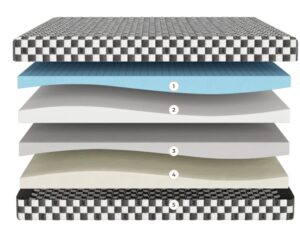 | Sweetnight Prime Mattress-Read Enhanced Review | Reversible- soft or firm, value priced, excellent back pressure relief | $760 In Queen after $506 Discount | |
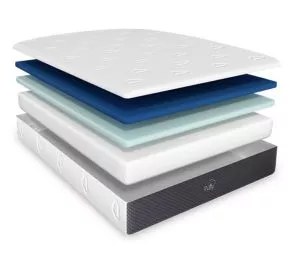 | Puffy Cloud Mattress-Read Enhanced Review | Medium firm, good for couples, side sleepers, tingling, numbness | $1049 In Queen After $1350 Discount | |
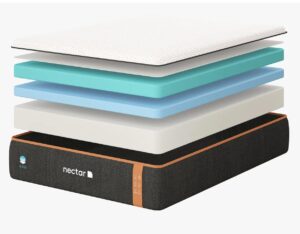 | Nectar Premier Mattress-Read Enhanced Review | Medium, excellent cooling, pressure relief, nerve pain at extremities | $999 In Queen Plus Sleep Bundle Freebies | |
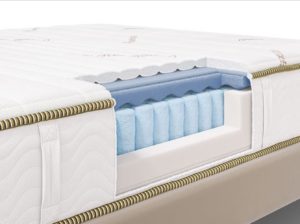 | Saatva Memory Foam Hybrid Mattress-Read Enhanced Review | Medium firm, good for couples, lower back pain, side sleepers, hip pain | $1495 In Queen after $300 Discount | |
 | Hyphen Copper Infused Memory Foam Mattress -Read Enhanced Review | Medium, excellent for pressure at hips and shoulders, leg tingling and numbness | $895 In Queen After $300 Discount | |
 | Nolah Original Mattress -Read Enhanced Review | Medium, great pressure relief on back or side, sleeps cool, helped my leg pain | $1014 In Queen After 30% Off + 2 Free Pillows |
Note: Recommended brands are mattresses I’ve personally tested. I have suffered from sciatica, peripheral nerve pain, and numbness for 30 years.
Peripheral neuropathy is caused by damage to the nerves outside of the brain and spinal cord (peripheral nerves), and can cause weakness, numbness and pain, typically in the hands and feet. It can also impact other areas of the body.
Your peripheral nervous system sends information from your brain and spinal cord to the rest of your body via the central nervous system. The peripheral nerves also send sensory information to the central nervous system. Finding the best mattress for nerve pain can reduce inflammation at key pain triggering areas.
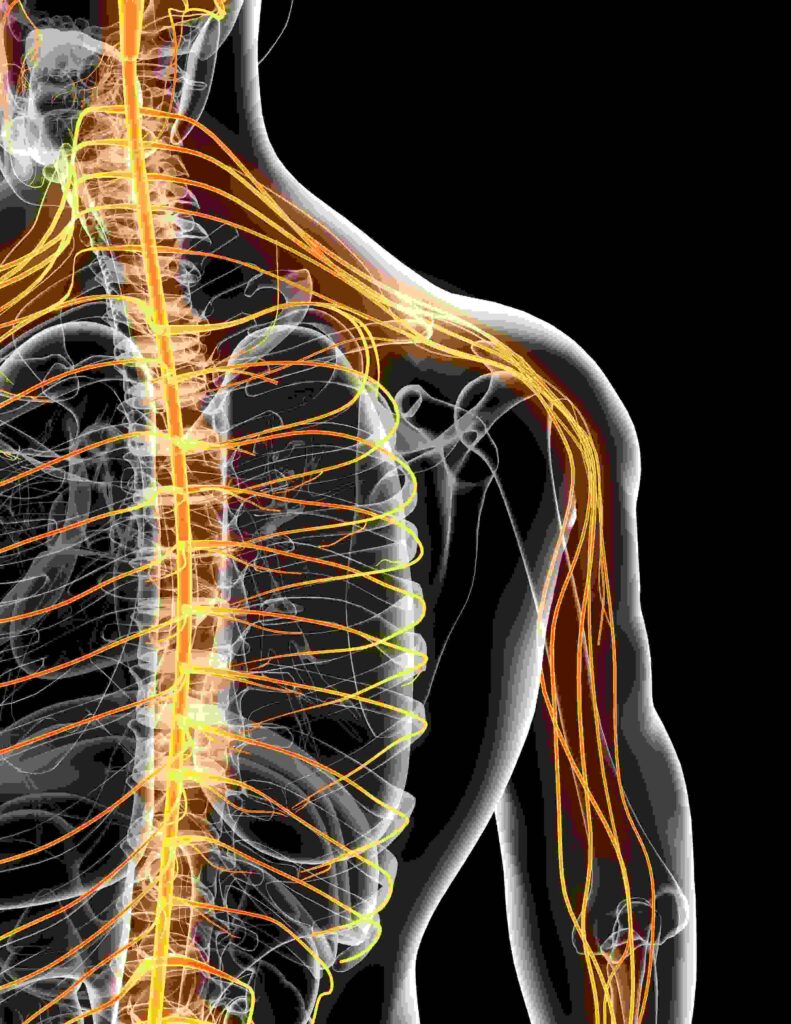
Peripheral neuropathy can result from traumatic injuries, infections, metabolic problems, inherited causes and exposure to toxins. One of the most common causes is diabetes, and in the last few years, even prolonged sitting can cause permanent damage to peripheral nerve endings by mashing and pinching nerves.
Sufferers describe peripheral neuropathy pain in a variety of ways, most often as stabbing, burning, needling, or tingling. In many cases, symptoms can improve, especially if caused by a treatable condition.
Medications can reduce the pain of peripheral neuropathy, and physical therapy, including exercise like walking and stretching can help improve vascular circulation and help heal nerve endings.
In the case of sciatic nerve pain, surgical interventions may be required to relieve the pain, usually by repairing spinal discs which can move out of place and cause pressure on the sciatic nerve.
In many cases, the opening (lumen) where the sciatic nerve passes through the bone in the vertebral column might need to be enlarged to minimize the damage.
In any event, finding the best mattress for nerve pain can help minimize pressure and allow your body to heal and rest. Often, sleep and spending time with your legs raised provides tremendous support.
The ideal mattress for nerve pain needs to incorporate some fairly soft ingredients such as a lower density memory foam, but the underlying support layer should be fairly firm. A hybrid mattress, made using a pocketed coil system is also a good component because it relieves pressure very precisely because of the independent suspension that each oil will provide, both pushing back and yielding as weight is distributed across its surface.
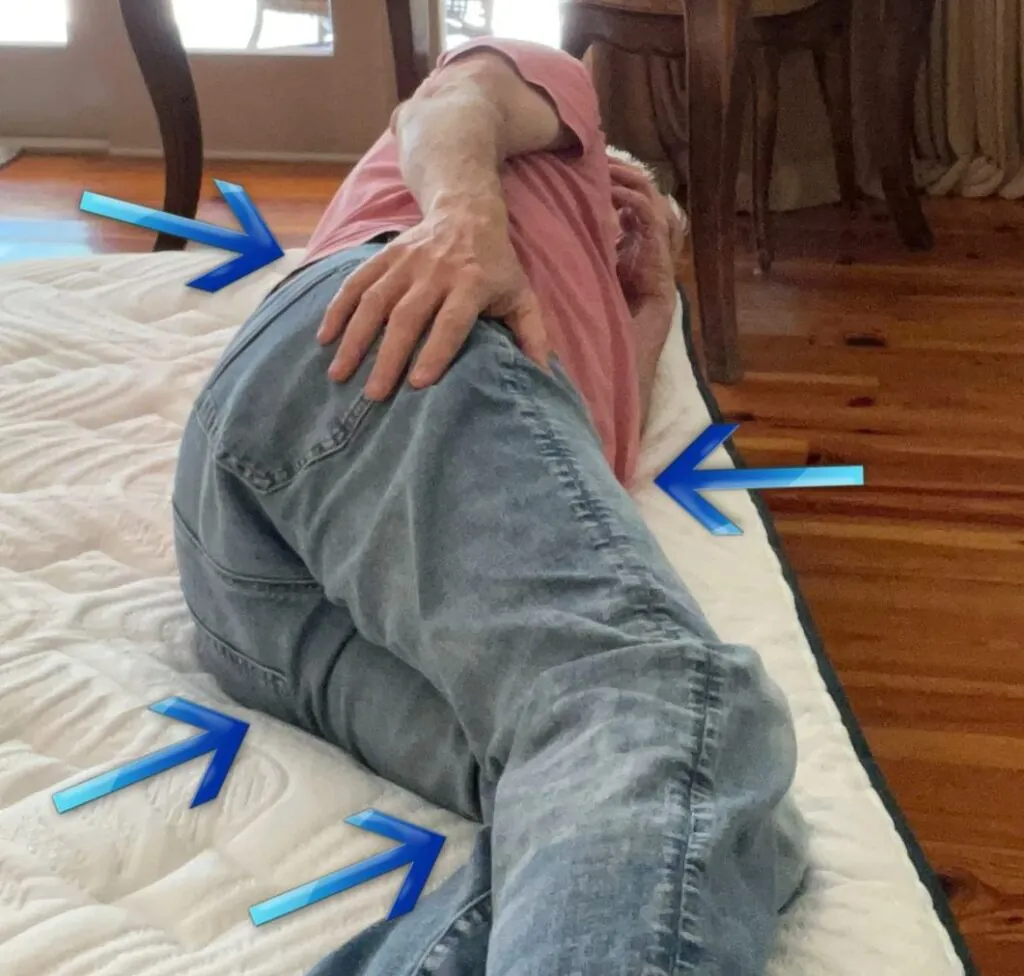
For pressure and pain relief, memory foam is an outstanding component used for distributing weight sideways, rather than downward, which serves only to compress the material underneath you, often collecting heat as well.
Memory foam, and other materials like natural latex tend to spread pressure sideways, much like kneading pizza dough and spreading it in sideways in a pan.
The pressure gets pushed sideways and out to the side of the mattress rather than down into the interior.
The best mattress for nerve pain will also be equipped with a fairly soft and sumptuous outer covering or topper piece which will provide a softer and more yielding initial feel.
At the same time, there should be proper edge support so that transferring is easy, allowing a person to comfortably sit on the edge of their bed to maneuver when putting on shoes, or transitioning to a walker or wheelchair in more severe cases.
The underlying foundation or base layer also provides firm, resilient support to prevent sinking and indentations. The company offers an outstanding trial period, a solid warranty, and is highly reviewed with over 6,000 4.8 star ratings out of five, accumulated over the last several years.
How Nerves Work, And What Happens When They Fail
Every nerve in your peripheral nervous system has a unique function, so symptoms depend on the type of nerves affected. Nerves are divided into three basic types:
Sensory nerves: receive sensation, such as temperature, pain, vibration or touch, from the skin. These nerves are divided into dermatomes, which are broad areas of skin on the body that send and receive signals from specific nerves servicing defined areas of the body, similar to a map.
Motor nerves: control muscle movement
Autonomic nerves: control functions such as blood pressure, heart rate, digestion and bladder function.
Signs and symptoms of peripheral neuropathy:
Gradual onset of numbness, needling sensations and tingling in your feet or hands, which can spread upward into your legs and arms. Symptoms include:
Sharp, jabbing, needling, numbness, or burning sensations
Extreme sensitivity to touch
Pain during activities that shouldn’t cause pain, such as pain in your feet when putting weight on them or when they’re under a blanket. Walking, sitting, or standing may cause pain. Pain experienced from sitting can also gradually get worse due to constant pressure on the nerve and surrounding tissues.
Lack of coordination and falling, due to neurological failure in muscle tissue, resulting in muscle weakness.
A sensation that you’re wearing gloves or socks.
Paralysis if motor nerves are severely damaged.
If autonomic nerves are affected, signs and symptoms might include:
Heat intolerance, extreme sensitivity to cold or hot temperatures.
Excessive sweating or not being able to sweat.
Bowel, bladder or digestive problems.
Changes in blood pressure, causing dizziness or lightheadedness.
Seek medical care right immediately if you notice unusual tingling, weakness or pain in your hands or feet. Early diagnosis and treatment offer the best chance for controlling your symptoms and preventing further damage to your peripheral nerves. Not a single disease, peripheral neuropathy is nerve damage caused by a number of conditions. Health conditions that can cause peripheral neuropathy include:
Autoimmune diseases. These include Sjogren’s syndrome, lupus, rheumatoid arthritis, Guillain-Barre syndrome, chronic inflammatory demyelinating polyneuropathy and vasculitis.
Diabetes. More than half the people with diabetes develop some type of neuropathy.
Infections. These include certain viral or bacterial infections, including Lyme disease, shingles, Epstein-Barr virus, hepatitis B and C, leprosy, diphtheria, and HIV.
Inherited disorders. Disorders such as Charcot-Marie-Tooth disease are hereditary types of neuropathy.
Tumors. Growths, cancerous (malignant) and noncancerous (benign), can develop on the nerves or press nerves. Also, polyneuropathy can arise as a result of some cancers related to the body’s immune response. These are a form of a degenerative disorder called paraneoplastic syndrome.
Bone marrow disorders. These include an abnormal protein in the blood (monoclonal gammopathies), a form of bone cancer (myeloma), lymphoma and the rare disease amyloidosis.
Other diseases. These include kidney disease, liver disease, connective tissue disorders and an underactive thyroid (hypothyroidism).
Other causes of neuropathies include:
Alcoholism. Poor dietary choices made by people with alcoholism can lead to vitamin deficiencies.
Exposure to poisons. Toxic substances include industrial chemicals and heavy metals such as lead and mercury.
Medications. Certain medications, especially those used to treat cancer (chemotherapy), can cause peripheral neuropathy.
Trauma or pressure on the nerve. Traumas, such as from motor vehicle accidents, falls or sports injuries, and sitting, can sever or damage peripheral nerves. Nerve pressure can result from having a cast or using crutches or repeating a motion such as excessive hand use, sports injuries, and other causes.
Vitamin deficiencies. B vitamins — including B-1, B-6 and B-12 — vitamin E and niacin are crucial to nerve health.
In a number of cases, no cause can be identified (idiopathic).
Why Sitting Is Dangerous And Can Lead To Neuropathy Generated Pain
How often do you sit? Think about it for a second.You sit in a car on the way to work probably in traffic. You sit at your desk for eight hours and maybe get up for 30 minutes at lunch just to sit again. On the way home, you sit in your car now in more traffic, only to sit on the couch to watch TV.
Sitting, though comfortable, is not healthy for our bodies. In fact, sitting does more harm than good. Our bodies were meant to stand. The natural curvature of the spine supports the weight of our body evenly. The longer one sits, the more strenuous it becomes for the body.
If you suffer with nerve pain, sitting for long periods of time is slowly damaging the nerves over time. Sitting can affect the nerves most vulnerable to pain sensations, such as tingling, burning or stabbing pain. Before I get into the dangers of sitting, this is a great time to stand, stretch or do a little dance in place.
Here are some silent causes of nerve damage and nerve pain, that often go unnoticed.
Increased Blood Sugar
For those of you living with diabetic neuropathy, high blood sugar should come as no surprise to increased nerve pain. Managing your blood sugar is key to managing nerve pain caused by long periods of sitting. It’s easy to manage your blood sugar with a proper diet (preferably gluten-free) and regular exercise. However, watching how long you sit can play a larger role in affecting your blood sugar.
Increased Blood Pressure
High blood pressure is dangerous for anyone and can be avoided with the help of walking, standing or even stretching. If your blood pressure increases due to sitting, it can damage your arteries. High blood pressure is not only damaging to the nerves, but it can lead to heart failure, stroke or heart disease.
Poor Circulation
Sitting for prolonged hours can lead to poor circulation throughout the body. Once circulation slows down due to sitting, your blood remains in the feet and legs, ultimately reducing blood flow. For those suffering with nerve pain, the lack of nutrients and oxygen from a proper blood flow can be harmful. Symptoms such as tingling or numbness escalate even more. Be sure to stand and stretch every 10-15 minutes to keep the blood flowing.
Pinched Nerves
Pinched nerves are a result of sitting too long or as a result of bad posture. Most pinched nerves are felt in the lower back due to the sciatic nerve. They can also be felt in the neck, legs or wrists depending on how you are sitting. You may feel a tingling or burning sensation as result of a pinched nerve making your neuropathy symptoms worse.
Muscle Deterioration
Muscle loss is a common symptom of nerve pain, in particular peripheral neuropathy. Sitting for hours on end can cause the muscles to shrink due to restricted movement. For some, the severity can be partial to complete loss of muscle function. Do your best to move those legs. Any movement is better than none.
I’ve found that memory foam mattresses, and even memory foam seat cushions, can help improve sitting pain. If you are going to sit for lengths of time, periodically get up and stretch or move.
Here are some tips to help get the body moving after a long day of siting, both at the office and at home.
DIY office tips:
Stand or stretch every 30 minutes. Feel free to do leg lifts from your office chair or roll your arms to the front and the back.
Try to sit up at all times. Good posture is key.
Request an ergonomic chair as needed. Sitting ergonomically correct can also support good posture, while typing on the computer.
Request a standing desk as needed. More employers are offering the choice for employees to try a standing desk. It can help to switch it up after a few hours of sitting.
Instead of emailing, walk over to your colleague’s office, in addition to getting you moving, the conversation may spur additional ideas.
DIY At Home Helpful Hints And Tips:
If you’re going to watch TV after a long day of work, get up and stretch during the commercials. Go ahead and try a few jumping jacks, squats or leg lifts to the side.
For those with a treadmill, watch your favorite late-night show while walking. Enjoy the best of both worlds.
If you want a little fresh air, go for a 30-minute walk around the neighborhood before you plop down on the couch. Take a walk to the mailbox and back or take the family pet out for a brisk walk.
Enjoy gardening? Summer is here, so why not plant a garden full of colorful vegetables. Gardening is good for the mind, body and soul.
The best thing anyone can do is to stay active and keep moving. Daily stretches or walks will help support proper circulation and reduce further health complications. The best mattresses for sciatica and nerve pain, along with a healthier lifestyle, can bring you a lot of relief.